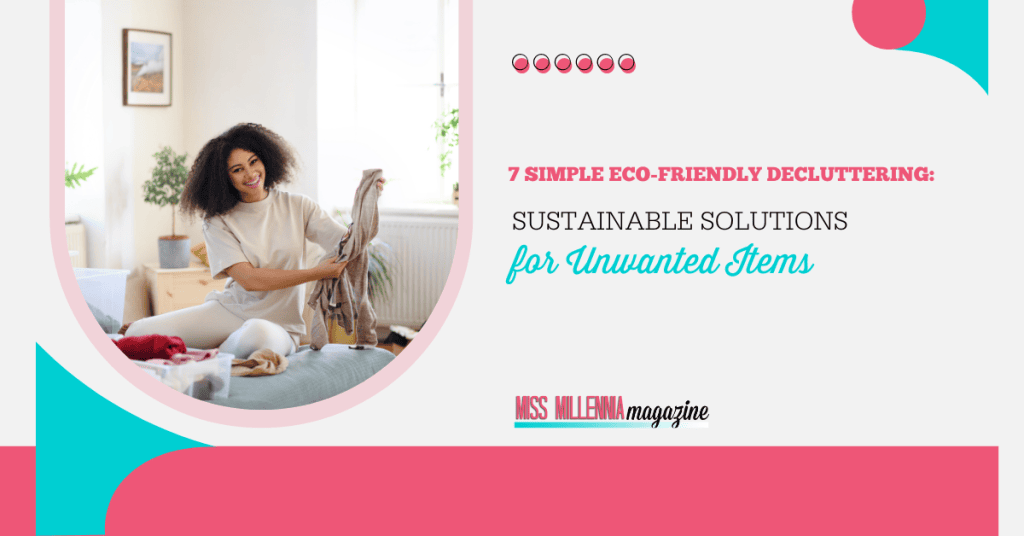7 Simple Eco-Friendly Decluttering: Sustainable Solutions for Unwanted Items
In the quest for a clutter-free home, it’s easy to forget the impact our discarded belongings might have on the environment. Landfills swell with the weight of once-loved items, contributing to pollution and resource depletion. However, decluttering doesn’t have to mean contributing to the waste problem.
By choosing sustainable avenues for giving unwanted items a second life, we can clean up our spaces while caring for the planet. Here, we’ll explore how you can embark on eco-friendly decluttering, ensuring that your efforts contribute positively to your home and the environment.
1. Think Before You Declutter
The first step in eco-conscious decluttering is to evaluate what you’re getting rid of and consider the most environmentally friendly way to dispose of it. Instead of automatically tossing items in the trash, consider whether they can be recycled, sold, donated, or repurposed. For instance, you can easily sell your silver, gold, or other precious items online. By carefully considering the disposal method for each item, you significantly reduce your environmental impact.
2. Selling Unwanted Items
One man’s clutter is another man’s treasure. Selling unwanted items clears up your space and extends the life cycle of those items. Clothing, electronics, books, and furniture can often find a second life with someone else. This method of decluttering benefits the environment by reducing waste and can also be an extra source of income for you.
3. Donating to Charity

Donating items to charity is another excellent way to declutter sustainably. Many non-profit organizations and local charities can reuse or repurpose your unwanted items, whether it’s clothing, household goods, or even vehicles. Before donating, ensure the items are in good condition and only give what is genuinely helpful to avoid burdening the charity with disposal costs. Moreover, donating can also provide you with a sense of fulfillment, knowing that your items are helping those in need.
4. Recycle What You Can
Recycling is a cornerstone of reducing waste, and many items in your home can be recycled instead of thrown away. Electronics, batteries, paper, and certain plastics can often be recycled at local centers. Look for specialty recycling services for items not accepted in regular recycling programs. For example, fabric and textile recycling programs can repurpose old clothes and linens, even if they’re too worn for donation. By taking the time to recycle correctly, you play a part in conserving resources and reducing landfill waste.
5. Upcycling and Repurposing

Upcycling involves transforming unwanted items into new products with better environmental value. This creative approach declutters your home and reduces your carbon footprint. For instance, old jars can become storage containers and worn-out clothes can be turned into cleaning rags or even handcrafted quilts. Similarly, repurposing items to serve new functions in your home can extend their usefulness and delay their journey to the landfill. This process cultivates a mindset of resourcefulness and innovation, allowing you to view your belongings in a new light.
6. Eco-friendly Disposal
Sometimes, items are too worn or broken to sell, donate, or upcycle. In such cases, look for eco-friendly disposal options. Some municipalities offer specialized disposal services for items like furniture and appliances, ensuring they are dismantled and recycled as much as possible. Additionally, consider companies specializing in eco-friendly junk removal, which strive to donate or recycle much of their collection. Choosing these options minimizes your environmental impact, even in disposal.
7. Building Sustainable Habits
Eco-friendly decluttering is not just about a one-time purge; it’s about cultivating habits that prevent waste accumulation in the first place. Consider adopting a mindful approach to what you bring into your home, prioritizing quality over quantity and opting for durable, repairable, and sustainably made items. By being intentional with your acquisitions, you reduce the need for future declutters and support a minimalist and environmentally conscious lifestyle.
Conclusion
Eco-friendly decluttering offers a pathway to a cleaner, more organized home without compromising the health of our planet. By choosing to sell, donate, recycle, repurpose, or dispose of items in an environmentally responsible way, we can significantly reduce our ecological footprint.
Furthermore, by adopting sustainable habits and making conscious choices, we can maintain our decluttered spaces and contribute to a more sustainable world. Decluttering, therefore, becomes not just a personal gain but a collective benefit, reinforcing the importance of our choices and their impact on the environment.








